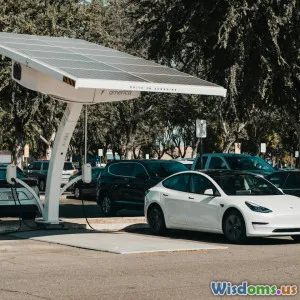
The Role of Technology in Sustainability
6 min read Explore how technology is transforming sustainability efforts across various sectors for a greener future. (0 Reviews)
The Role of Technology in Sustainability
In today’s world, the need for sustainable practices is more pressing than ever. As climate change continues to pose significant threats to our environment, technology emerges as a crucial ally in our quest for sustainability. From renewable energy solutions to smart agriculture and waste management, technology is reshaping our approach to environmental stewardship. This article delves into various technological innovations that are driving sustainability efforts across different sectors.
1. Renewable Energy Technologies
One of the most significant advancements in sustainability has been the increase in renewable energy technologies. Solar panels, wind turbines, and hydropower systems are leading the charge in reducing reliance on fossil fuels.
Solar Energy
Solar photovoltaic (PV) technology has evolved dramatically, with efficiencies improving and costs declining. According to the International Energy Agency (IEA), solar energy capacity has grown exponentially, with countries like China, the U.S., and Germany leading the way. Innovative solutions, such as floating solar farms and solar skin designs, are expanding the possibilities of solar energy production.
Wind Energy
Wind energy, another pillar of renewable technology, has also seen tremendous growth. Offshore wind farms are becoming more common, harnessing stronger and more consistent winds. The global wind power capacity reached over 743 GW in 2020, contributing significantly to reducing greenhouse gas emissions.
2. Smart Agriculture
Agriculture is a significant contributor to environmental challenges, but technology is paving new paths for sustainable farming practices.
Precision Farming
Precision agriculture employs GPS technology and IoT devices to monitor crop health, soil conditions, and weather patterns. This data-driven approach allows farmers to optimize resource use, reduce waste, and increase yield. For example, sensors can detect when crops need watering, ensuring that water is used efficiently.
Vertical Farming
Vertical farming is another innovative approach that utilizes technology to grow food in urban environments. By using controlled environments and hydroponics, vertical farms can produce food with minimal water and land use, significantly reducing the carbon footprint associated with traditional agriculture.
3. Waste Management Innovations
Technology plays a pivotal role in addressing waste management challenges, which are critical for sustainability.
Smart Waste Management Systems
Cities worldwide are adopting smart waste management systems that utilize sensors and data analytics to optimize collection routes and schedules. By analyzing waste generation patterns, municipalities can reduce fuel consumption and improve operational efficiency.
Recycling Technologies
Advancements in recycling technology are also making it easier to process materials like plastics and metals. New methods, such as chemical recycling, allow for the breakdown of plastics into their original monomers, enabling them to be reused in new products. This reduces the need for virgin materials and minimizes waste.
4. Sustainable Transportation
Transportation is another area where technology is making significant strides toward sustainability.
Electric Vehicles (EVs)
Electric vehicles have surged in popularity, offering a cleaner alternative to traditional gasoline-powered cars. Advances in battery technology are enhancing the range and efficiency of EVs, making them a viable option for many consumers. Furthermore, the integration of EVs into smart grids allows for better energy management and load balancing.
Public Transportation Innovations
Innovations in public transportation, such as real-time tracking apps and electric buses, are encouraging more people to opt for sustainable transit options. By improving the efficiency and accessibility of public transport, cities can reduce congestion and lower carbon emissions.
Conclusion
The role of technology in promoting sustainability cannot be overstated. As we face growing environmental challenges, innovative solutions like renewable energy, smart agriculture, waste management technologies, and sustainable transportation are essential. By harnessing these technologies, individuals, businesses, and governments can work together to create a more sustainable future. The journey towards sustainability is a collaborative effort, and technology will continue to be a vital partner in this endeavor.
Rate the Post
User Reviews
Popular Posts





















